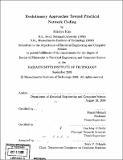Evolutionary approaches toward practical network coding
Author(s)
Kim, Minkyu, 1976-
DownloadFull printable version (14.09Mb)
Other Contributors
Massachusetts Institute of Technology. Dept. of Electrical Engineering and Computer Science.
Advisor
Muriel Médard and Una-May O'Reilly.
Terms of use
Metadata
Show full item recordAbstract
There have been numerous studies showing various benefits of network coding. However, in order to have network coding widely deployed in real networks, it is also important to show that the amount of overhead incurred by network coding can be kept minimal and eventually be outweighed by the benefits network coding provides. Owing to the mathematical operations required, network coding necessarily incurs some additional cost such as computational overhead or transmission delay, and as a practical matter, the cost of special hardware and/or software for network coding. While most network coding solutions assume that the coding operations are performed at all nodes, it is often possible to achieve the network coding advantage for multicast by coding only at a subset of nodes. However, determining a minimal set of the nodes where coding is required is NP-hard, as is its close approximation; hence there are only a few existing approaches each with certain limitations. In this thesis, we develop an evolutionary approach toward a practical multicast protocol that achieves the full benefit of network coding in terms of throughput, while performing coding operations only when required at as few nodes as possible. We show that our approach operates in a very efficient and practical manner such that it is distributed over the network both spatially and temporally, yielding a sufficiently good solution, which is at least as good as those obtained by existing centralized approaches but often turns out to be much superior in practice. We broaden the application areas of our evolutionary approach by generalizing it in several ways. First, we show that a generalized version of our approach can effectively reveal the possible tradeoff between the costs of network coding and link usage, enabling more informed decisions on where to deploy network coding. Also, we demonstrate that our approach can be applied to investigate many important but, because of the lack of appropriate tools, largely unanswered questions arising in practical scenarios based on heterogeneous wireless ad hoc networks and fault-tolerant optical networks. (cont.) Finally, further generalizing our evolutionary approach, we propose a novel network coding scheme for the general connection problem beyond multicast, for which no optimal network coding strategy is known. Our coding scheme allows general random linear coding over a large finite field, in which decoding is done only at the receivers and the mixture of information at interior nodes is controlled by evolutionary mechanisms.
Description
Thesis (Ph. D.)--Massachusetts Institute of Technology, Dept. of Electrical Engineering and Computer Science, 2008. Includes bibliographical references (p. 133-137).
Date issued
2008Department
Massachusetts Institute of Technology. Department of Electrical Engineering and Computer SciencePublisher
Massachusetts Institute of Technology
Keywords
Electrical Engineering and Computer Science.